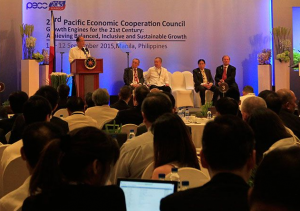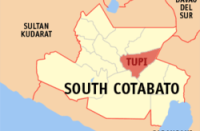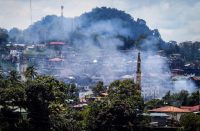
(Eagle News) — President Benigno S. Aquino III on Friday stressed the importance of investing in people or the so-called human capital so they could be better partners in the country’s growing economy.
The President cited the Philippine experience in pursuing inclusive growth, where he said the government had made massive investments in the people through the conditional cash transfer program or CCT, the implementation of the K to 12 basic education curriculum, and programs of the Technical Education and Skills Development Authority (TESDA)
In his speech welcoming the delegates attending the 23rd Pacific Economic Cooperation Council (PECC) general meeting, President Aquino underscored the role of the Filipino people in the country’s growing economy.
“They are our Bosses, and we see them as our most vital partners in growing the economy,” he said in his speech during the opening ceremony of the three-day forum, which carries the theme “Growth Engines for the 21st Century: Balanced, Inclusive and Sustainable Growth”, at the Sofitel Philippine Plaza Hotel in Pasay City.
The Philippines is hosting the PECC general meeting for the second time since 1999.
“The Pacific Economic Cooperation Council (PECC) is an excellent example of a belief I have always held: the challenges of a country, or even of the world, are not for a mere few to solve. Each one of us must do his part. Standing here today, in front of an audience composed of representatives from business, the academe, governance, and other sectors, I see that belief realized,” the President said.
He said that since 1980, the PECC has contributed so much, not only in crafting policy, but also in shaping a more stable and more prosperous Asia Pacific.
“Indeed: By working together, we will find it much easier to solve our collective challenges. Foremost among these is how to achieve balanced, sustained, and inclusive growth,” the President said.
In his speech, President Aquino also took note of the thinking that the economy is the only “growth engine”, the focus being on economic growth, hoping that its benefits would trickle down to the people.
“My administration views it differently. The Filipino people are front and center in our governance agenda. Over the years, they have proven to be our country’s greatest resource — from the time they rose up against a dictator to reclaim democracy, to the time they voted for meaningful change in 2010, and even to the present day, as they fuel our resurgent economy,” he told the audience composed of business, government and civil society leaders from the Asia-Pacific region.
“As we have invested in the Filipino people these past few years, so too have we been hard at work to ensure that these investments pay off — that the Philippines becomes a true regime of opportunities,” he said.
Inclusive growth fosters stability, which is necessary for continued growth, he said, explaining that capacitating the people means empowering them to take advantage of opportunities that arise, and they in turn gain the ability to make greater contributions to both government and society-at-large, helping foster an even more inclusive economy.
The President also said systematic reform has been implemented to level the playing field and create an attractive climate for business. These reforms, he said, include holding the corrupt accountable, plugging leaks and holes in the system, and exercising fiscal prudence.
“Transparency and accountability are no longer just ideals; they are realities in the Philippines. The sea change that has swept our country has gained the administration the confidence of the world,” the Chief Executive said.
He reported that the Philippines’ competitiveness indices have climbed “at a tremendous pace”, and that the country has achieved investment grade – and is continuing to receive upgrades – from the three major credit ratings agencies.
The Information Technology-Business Process Management (IT-BPM) sector currently employs more then a million individuals and earns nearly $19 billion in revenues, while manufacturing has rebounded completely, growing by 8 percent from 2010 to 2014, he said.
In 2014, foreign direct investments were at “an all-time high” at $6.2 billion, while domestic investments totaled P2.09 trillion from the third quarter of 2010 to the last quarter of 2014, compared to only P1.24 trillion from the first quarter of 2003 to the second quarter of 2010.
“It goes without saying: Everyone, across the entire spectrum of society, is fully and completely engaged in growth—and we want to accelerate this momentum. Government is exerting the maximum effort to further engender an atmosphere conducive to business, down to our communities,” President Aquino said, referring to government efforts to ensure that micro, small, and medium enterprises (MSMEs) reach their full potential.
The SME Roving Academy, he said, has helped more than 85,000 potential and established Filipino entrepreneurs by training them in business planning, financial management, and product pricing and costing.
He announced that by the end of the year, 100 Go Negosyo, or business centers will be put up across the country.
“What our government has done over the last few years has been to stimulate a virtuous cycle of empowerment, where the growth of business, industry, and the wider economy is spurred by the participation of the dynamic, innovative, and hardworking Filipino people. At every step of the way, our government is there to provide support. At every step of the way—whether we are studying the plans for a new bridge, or evaluating fiscal policy—we have always asked ourselves, ‘How does this redound to the benefit of our countrymen?’,” he said, adding that the success of this strategy is proof that economic progress is inseparable from the progress of the people.
“Good governance works. Reform works. Even more encouraging is the fact that transformation has not just taken place in our institutions and our economy; it has taken place in the mindset of Filipinos. We see today a people who have felt the effects of good governance—and who will refuse to accept anything less. My countrymen will continue to demand integrity, accountability, and sustainable, inclusive growth even after I have stepped down from office. They will demand the continuity of the successes we have reaped,” the President said.
Also present during the opening were PECC Chairperson Ambassador Antonio Basilio, PECC co-chairpersons Jusuf Wanandi and Donald Campbell, Trade and Industry Secretary Gregory Domingo, and National Economic and Development Authority Secretary Arsenio Balisacan.
The PECC meeting will tackle the future and impact on inclusive regional economic integration of mega-regional trade pacts, including the ASEAN Economic Community and the Trans-Pacific Partnership, sustainable investments in metals and mining sector, integrating small and medium enterprises and peripheral cities to global commerce and value chains, the internet economy, the role of micro and social enterprises in promoting inclusive growth, and the need to build resilient societies in response to increasing risks and vulnerabilities from severe natural disasters.
Recommendations from the PECC forum will feed into the Asia-Pacific Economic Cooperation Leaders’ meeting in November. (with a PND report)







